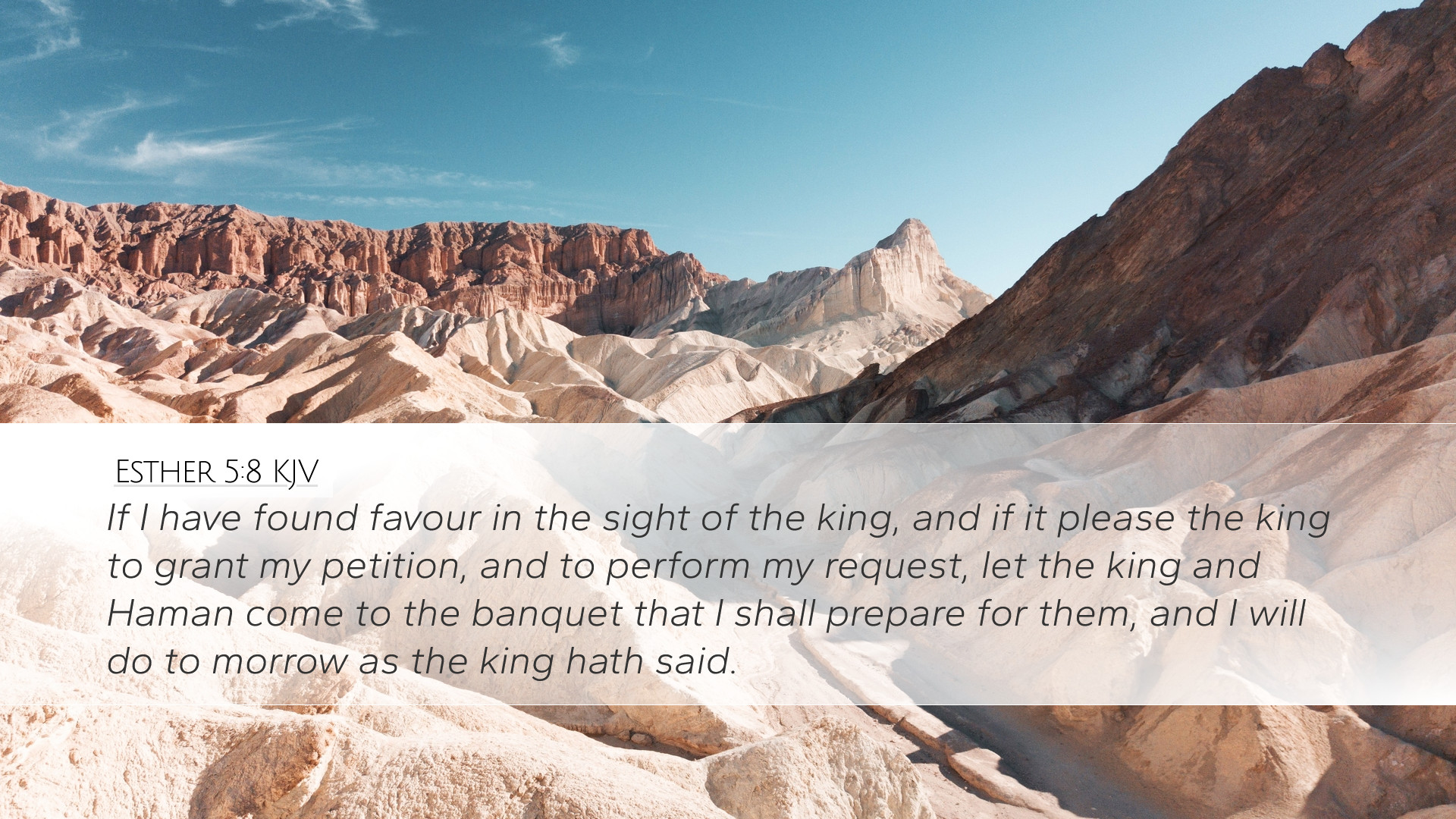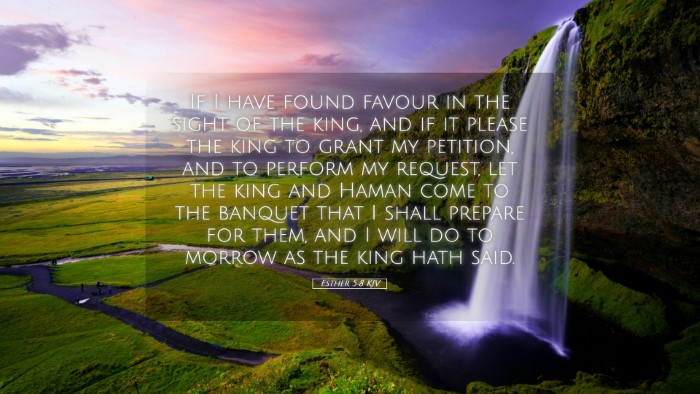Old Testament
Genesis Exodus Leviticus Numbers Deuteronomy Joshua Judges Ruth 1 Samuel 2 Samuel 1 Kings 2 Kings 1 Chronicles 2 Chronicles Ezra Nehemiah Esther Job Psalms Proverbs Ecclesiastes Song of Solomon Isaiah Jeremiah Lamentations Ezekiel Daniel Hosea Joel Amos Obadiah Jonah Micah Nahum Habakkuk Zephaniah Haggai Zechariah MalachiEsther 5:8
Esther 5:8 KJV
If I have found favour in the sight of the king, and if it please the king to grant my petition, and to perform my request, let the king and Haman come to the banquet that I shall prepare for them, and I will do to morrow as the king hath said.
Esther 5:8 Bible Commentary
Commentary on Esther 5:8
Esther 5:8 (KJV): "If I have found favour in the sight of the king, and if it please the king to grant my petition, and to perform my request, let the king and Haman come to the banquet that I shall prepare for them."
Introduction
The passage of Esther 5:8 marks a pivotal moment in the narrative of Esther, where Queen Esther courageously steps forward to intercede for her people. Esteemed commentators like Matthew Henry, Albert Barnes, and Adam Clarke provide rich insights that shed light on the depth of this passage and its implications for faith and divine providence.
Contextual Background
Esther, once an orphaned Jewish girl, has risen to become queen of Persia. The narrative unfolds against a backdrop of tension and impending doom for the Jewish people, as Haman’s evil plot threatens their annihilation. Esther finds herself in a unique position of influence, but the perilous nature of her situation requires wisdom and strategy.
Exegesis of Esther 5:8
Matthew Henry's Insights:
- Henry emphasizes the significance of Esther’s request, noting that her approach is grounded in humility and a sincere desire for the king's favor. It illustrates the principle that God often uses the means of persuasion and gentleness in His plans.
- He also highlights Esther’s reliance on divine providence, suggesting that her strategic invitation to the king and Haman is not merely an act of political savvy but a calculated move directed by God’s guidance.
Albert Barnes' Commentary:
- Barnes discusses the importance of timing in Esther's plea. He argues that she demonstrates spiritual wisdom by preparing a banquet, which would offer a relaxed environment conducive to the king's heart being swayed.
- Furthermore, Barnes points out the phrase “found favor” as indicative of the divine grace bestowed upon Esther. Her confidence comes not from her position alone but from the assurance that God is with her.
- He suggests that the dual focus on both the king and Haman reveals Esther's awareness of the power dynamics at play, recognizing that individual hearts must be addressed in her appeal for justice.
Adam Clarke's Reflections:
- Clarke focuses on the nature of Esther’s banquet, interpreting it as symbolic of communal fellowship and unity. Such gatherings were significant in ancient cultures, serving both social and political functions.
- He also analyzes the psychological aspects of her request. Esther's invitation to Haman simultaneously positions herself as a confident leader while subtly exposing Haman’s treachery without confrontation.
- Moreover, Clarke notes that Esther’s scheme reflects a deeper theological truth: God often orchestrates events through seemingly innocuous gatherings, hinting that divine purpose is accomplished through human relationships.
Theological Implications
This verse encapsulates themes of risk, faith, and divine intervention. Esther's willingness to confront the king and Haman invites reflection on the courage required of believers when advocating for justice. It challenges pastors and theologians to consider how God uses individuals in moments of crisis for His greater purposes.
- Courage in Advocacy: Esther’s example underscores the critical need for bravery in standing up for the marginalized and oppressed. By inviting both the king and Haman, she holds the potential for salvation while navigating personal risk.
- Divine Providence: Her petition reveals that God's hand is at work, illustrating that His plans often unfold through our faithful actions. This serves as a reminder for students and scholars that God’s kingdom advances not only through grand gestures but also through ordinary acts of hospitality and love.
- The Power of Influence: Esther’s unique position as queen allows her to use her influence strategically. This invites pastors to reflect on how they can leverage their platforms to speak out against injustice effectively.
Application for Life and Ministry
As we reflect on Esther 5:8, several applications surface for contemporary life and ministry:
- Strategic Evangelism: Just as Esther prepared a banquet, believers are called to create environments where dialogue about faith can flourish.
- Encouragement to Pray: Recognizing the importance of divine guidance, individuals should commit to prayer for their leaders and those in positions of power, trusting that God can soften hearts.
- Promoting Justice: Ministries should advocate for justice, reflecting Esther's bravery, by actively engaging in the issues affecting their communities akin to Esther's intercession for her people.
Conclusion
Esther 5:8 serves as a remarkable testament to faith in action, encapsulating the interplay of courage, divine providence, and the pivotal role of human agency in the unfolding of God's plans. Insights from Henry, Barnes, and Clarke reinforce the timeless nature of this message, encouraging believers to act with wisdom and courage in their own contexts.


